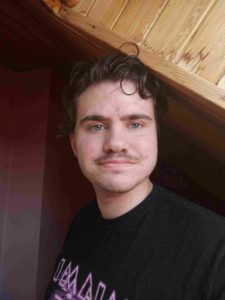Prior to my arrival in Besançon, I worked as an imaging specialist for a digital library for over a year. I was tasked with scanning research materials on behalf of the art museum with whom the library had formed a partnership. Although my time there was brief, it was intriguing to encounter a plethora of items of interest, from art catalogs to regional maps and literature in various languages. Handling such materials, often fraught with fading ink or flaking paper, made me think about efforts to preserve the past more generally and investigations into it as the tactile mixture of both loss and discovery.
Before book scanning, I worked at my hometown public library for over three years. There I gained a very real sense that the provision of books and other means of information is a social good, a communal necessity. I believe their shared exchange has a communicative character. A place is offered for each patron, whether for solitary or participatory study, to allow access to practical or theoretical knowledge, or to sustain their escapism or supplement their epiphanies. As I worked in these libraries, I made piecemeal advances researching the microhistory of my own genealogy in the context of empire.
Inquiries into my familial past have brought me into contact with archival sources, out-of-print works, and digital ephemera related to such ineffably unexpected figures as the intellectuals Bertrand Russell and Besançon’s own Pierre-Joseph Proudhon. I’m hoping that my lessons here in rare books and the toolkit provided by the digital humanities will set me on a path to make sense of this corpus, or ultimately shed greater light on questions regarding institutional or collective memory. Perhaps Besançon will be your next stop in pursuit of yet unrealized investigations or inquiries.
Image source: https://archive.org/details/baskes_1019_g445_1911/


